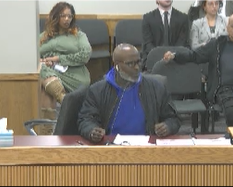A PRISONER'S REALITY
On the typical Monday through Friday, my day would start out by waking up around 4 a.m., having a cup of coffee and then taking care of my personal hygiene, brushing my teeth and hair, putting on deodorant and the like. Then I would go down to Frances' cell to wake him up so that he could get ready to get his medication at 4:30a.m.
At that time is when many DLA’s, that is Daily Living Assistants, assist the elderly inmates, also known as patients, get to the Medical building. Once there, they take their insulin shots or medications that are considered "Watch Take,” meaning they must take that particular medication in front of medical staff so staff can verified it's been taken.
All DLA's have permission to enter any cell with a patient. Before I entered, I would call his name to wake him and ask him, " Are you ready for today?" My question would always be met with a grouchy response of, "No!” While Frances would put on his clothes and shoes, I would prepare his mouth wash and a warm face cloth for him. Once he was done, he would walk out of his cell and sit in his wheelchair and off to medical we would go.
Once at medical, I would push Frances up to the " Medication Watch Take” area at the entrance of the Medical Unit. Most of the nursing personnel know all the inmates who take 4:30a.m. medications by name! Frances would always be greeted with an expression of kindness. " How is your morning, Mr. Frances?”, the nurse would ask. Frances would normally say, " I haven't had a cup of coffee yet.” The nurse and I would both just smile. After he's taken his medication, I would push him back to our housing unit where his cup of coffee would await him -no cream, no sugar.
If the patients do not eat in the housing units, they are then pushed to the chow hall for breakfast. Frances is not a morning person, so he did not go to the chow hall for breakfast. After breakfast, all cell doors are required to be locked until after morning count is completed. I would go to my cell and take a nap while waiting on the doors to open back up, usually sometime around 7:30a.m.
Once the doors are opened for the morning, our daily activities are resumed until 10 a.m. when we would go back to the chow hall for lunch. Some patients would choose to stay in their rooms, while others, like Frances, would come out into the unit -or wings -to participate in activities. Being that most of the patients have debilitating illnesses, most would rather not go outside, preferring the relative comfort of the wing. Frances enjoyed his coloring books while listening to his audio books that he has on his tablet. I would usually be off in another conversation with another patient.
When he was ready to shower, I would push the button in the shower to get the water nice and hot before he entered it. I would already have his shampoo out and his towel and clothing neatly folded and ready for him by the time he headed to the shower.
I would then mark that Frances had a shower on my log sheet. I would also mark that he did not go to breakfast and that his mood levels were normal. These weekly log sheets are essential for classification staff to fully be informed concerning the patients and their daily activities.
The entire environment in these wings is similar to a day room for elderly in a nursing home. It's pretty much quiet, for the most part, which is something that the patients enjoy the most. Sometimes the inmates would just rather be in their own little world, and the quiet setting helps.
We would often change up the routines and the prison's "Puppies for Parole” dog handlers would bring in the dogs to spend time with the elderly. It usually really brightens their day to get to play with the dogs. The dog handlers would have the dogs do tricks on command and rewarded them with treats.
By 10:45 a.m., lunch would be announced over the loudspeaker in each wing calling us to go to the chow hall to eat. There is a short distance walk from the housing unit to the chow hall. As I push Frances down the path to the show hall -called the Boulevard -we would see other inmates from other housing units that are usually having conversations about who may have been transferred or went to the hole or solitary confinement.
Once in the chow hall, we’d roll up to the small window where our food trays get pushed out to us from the kitchen, Frances would grab one for himself and one for me, then I'd find a wheel chair accessible spot for him at one of the tables, I would then go and grab him some juice or water, depending on what he was feeling like having, and utensils to eat. There is always commotion in the chow hall, enough usually to keep people’s attention.
Frances continues to reflect on how much better the food is in outside society. He does not enjoy his food cold. Almost all prison food is served cold. There is something that usually triggers him to not want to interact very much. Sometimes he would say, out loud in a mild voice, "They feed us like animals.” I would often allow him to say his peace concerning whatever issue that may have triggered an emotional reaction out of him that day, without responding, He would look at me and ask, "Antwann, was the food anything like this 27years ago? I don't know how you could've done it." I would respond, "No! Food was much better back then." Then I would say, "I'll tell you what, let’s go back to the housing unit and I'll cook you your favorite meal." He would chuckle and say, "Okay!" Frances loves egg noodles with chicken gravy and roast beef.
After the meal, time would pass by so fast. Before we knew it, it was time to lock down for count at 2:30 p.m.. The doors would stay closed until 4 p.m. and then stay opened until 10p.m.
Around 4:45 p.m., dinner would be announced over the loudspeaker. Once again, Frances and I would be off to the chow hall. Today’s meal wasn't so bad. We had chicken patty, mashed taters, coleslaw and iced cake. " Mmmm mmmm", Frances said as he grabbed our trays. Of course, he would always say, "Antwann, I know you're not going to eat this tray," the inflection in his voice posed as if he did not already know the answer to that question. I always give Frances my trays because I am blessed to be able to afford canteen, and therefore rarely eat at the chow hall. So, I'd reply, "Frances, you're the only person I'll give this tray to." It would take nearly 25 minutes for him to finish eating.
When it's time for Frances to lock down for the night, he always calls me over to his table and shows me the picture he's just finished coloring and says with a smile, "I appreciate you Antwann, I'll see you at 4 a.m. Okay?"
This I can honestly say; all in all, we make the best out of what's available and are always optimistic in stressful situations.




